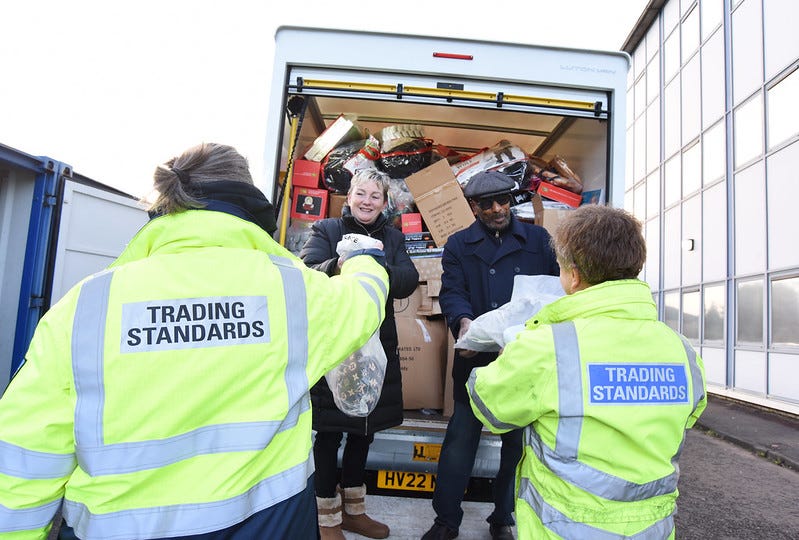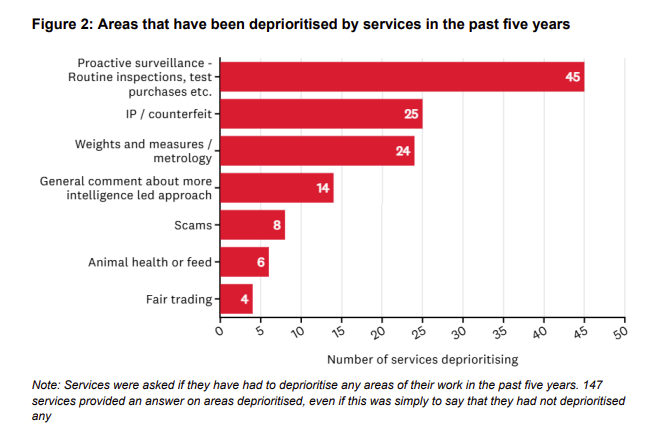The Great Restoration starts locally
While most of the British right are heading off on flights of fantasy about leaving the ECHR, and scribbling Great Restoration bills, there is very little realism in terms of how we get a grip on immigration. The answer, though, is staring us in the face. We have to enforce the laws we actually have.
Last week, Robert Jenrick said “The time has come for muscular action to make integration a reality”. Jenrick is a very clever man but I do wonder if he understands the scale of what he proposes. In order to tackle this problem, you first have to name it. Yes, there are peripheral integration problems with a few ethnic communities, particularly recent arrivals, but the most immediate issue is Pakistani Moslems.
For decades now, they’ve been given a free pass to live separately according to their own laws and customs. This amounts to a golden ticket where there is no behaviour out of bounds. They do not live according to our laws, and they do not respect them. Grooming is part of it but it also extends to organised crime, massive fraud, and murder. The reason they marry their cousins is because large Pakistani families are essentially international crime syndicates.
That is your baseline for any “muscular action” on integration. You actually have to enforce our existing laws. But this isn’t done. If you were serious you’d have to take a close look at the vape shops (or indeed any of their high street businesses) , the back street solicitors offices up to their necks in visa fraud, the garment factories and the curry houses. They are all pipelines for illegal immigration.
Then there’s the mosques themselves. A desert religion has no need of mosques. Every mosque in the UK is an insurrectionist command post and a parallel town hall through which all the dirty dealings are done. They’re not just hate factories. They play a pivotal role in the local “business community”. Then there’s the political corruption which goes hand in hand with tribal rivalries. They’re not becoming local councillors to fix potholes. They’re in it to control liquor boards, planning and housing.
We do need to take superficial integration measures such as banning the burka, and indeed male Moslem attire, and shut down the Sharia courts, but that’s just the tip of the iceberg. The bottom line is that most mosques should be closed and any remaining ones placed under close surveillance and supervision.
And here’s the thing. There’s reason police don’t crack down on the obvious criminality we see in broad daylight. Any attempt at doing so will see a political pushback with cries of Islamophobia. Ethnic minorities are expert at playing the victim card - which is why grooming has gone on as long as it has.
Basically, any “muscular integration” measures would look a lot like the FBI action against the Mafia - because that’s exactly what they are. If the aim is integration, you have to cut these crime syndicates off from their homelands. That means more anti-laundering policing, more overseas financial transaction taxes, and bans on anyone with foreign heritage holding public office. It’s also going to require a lot of exemplary deportations. The hate preachers have to be jailed and deported, but anyone even associated with radical mosques has to go. We also need to close down Islamic faith schools.
Essentially, it’s going to look a lot like a remigration programme. If you are serious about “integration” then we cannot have entire communities whose loyalties and business interests are split between Britain, Islam and Pakistan. As such, we’re going to have to close down dual citizenship. There can be no half-measures. It’s going to require a full spectrum of enforcement.
As such, if Robert Jenrick is going to talk about “muscular integration” then he needs to set out a comprehensive policy otherwise it’s just empty rhetoric. It can’t just be surface level window dressing like banning the burka. But that then brings us to the crux of the issue. If Jenrick actually did this, his own party would throw him under the bus. Serious action is too rich for their blood and we can’t even expect it from Reform either. If we’re not going to name the problems we have no chance of solving them.
Addressing this, though, does not start with grand gestures and constitutional tinkering - and certainly not opening up tedious diplomatic rows over Northern Ireland. This is a point I’ve made many times over, but we only get a grip on the problems through proper local enforcement - which is gradually vanishing.
It’s hard to obtain exact data on enforcement and the collapse of prosecutions. I have suggested to Lewis Brackpool of Restore Britain that they launch their own data gathering initiative which would strengthen the case they make in their mass deportations report - but I won’t hold my breath. We can, though, make certain assumptions on the basis of existing works.
A recent Which? investigation into trading standards is quite enlightening.
“Remarkably the Which? FOI request is the only comprehensive source of information on how local authorities are resourcing and prioritising Trading Standards work, reflecting a lack of digital infrastructure and accountability within the system. We found places where an entire London borough relies on just one lone officer to protect its citizens from an avalanche of consumer threats - a single person against the might of global businesses and cunning criminals. We also found swathes of Trading Standards responsibilities that appear to get very little attention”.
The FOI also revealed a great variation in the nature and level of enforcement activity across Trading Standards teams to address non-compliance. While a tailored approach will be needed – from supporting businesses to comply to taking more formal criminal or civil enforcement action when needed - this would not appear to account for why some authorities are more proactive in using their legal powers than others. A few services had much higher numbers of criminal prosecutions than others, for example. West Sussex reported the largest number by far, with 159 prosecutions reported across multiple categories. West Yorkshire Joint Services and Bristol also reported a large number of criminal prosecutions at 41 and 40, respectively. Meanwhile, there were a striking number of services, 36, who reported no criminal prosecutions in the 2023-24 financial year. A further 25 services reported only one criminal prosecution”.
An STV report notes that trading standards in Scotland at ‘lowest ebb’ as workforce falls, sector warns. New data shows the full-time equivalent number of staff in the profession is down by more than 50% since 2002.
Elsewhere we find that:
“More than 2,000 food hygiene inspections in a county’s restaurants, cafes and takeaways are overdue, a local authority has revealed. West Northamptonshire Council is responsible for carrying out inspections on all food premises, with the highest risk locations required to have a visit at least every six months. However, the council’s food safety team has been unable to address a backlog of 2,061 food hygiene inspections, including 585 new, unrated premises that have never received an official visit by an inspector”.
Meanwhile, we can take an educated guess as to why we’re seeing a rise in illegal HMO conversions...
“The 85 councils able to provide figures employed 707 full-time equivalent building control staff in December 2010, but by December 2020, this had fallen to 513 – a 27.4% reduction. If this is representative, it would mean councils lost in the region of 1,400 building control staff across the decade”.
Further private research is also illuminating. Data collected by Public Interest Lawyers shows that councils in England and Wales received almost half a million complaints about landlords and housing conditions in just five years. However, local authorities took just 1,285 rogue landlords to court, with over a hundred saying that they prosecuted none at all.
252 councils, or 80% of the metropolitan, unitary, district, London or Welsh local authorities, responded within the time frame for a request. 115 (46%) confirmed that there were no prosecutions at all from April 2019 to March 2024.
A further 49 only sought court action against a solitary landlord in the five-year period, meaning just under two-thirds of councils did not undertake a court prosecution of multiple landlords.
Most prosecutions related to a failure to adhere to prohibition notices or breaches of regulations regarding Houses in Multiple Occupation (HMOs). In some cases, landlords were penalised in court for harassment or for illegally evicting tenants.
Some councils have argued that civil penalties, as well as formal warnings, have been sufficient in maintaining landlord compliance.
However, the National Residential Landlords Association (NRLA) learned earlier this year that less than half of the fines issued against rogue landlords between 2021 and 2023 had been collected.
It should also be noted, that of what little enforcement action is carried out, there is nothing that compels local authorities to liaise with the Home Office or immigration enforcement arms.
The overall picture suggests that since the age of austerity, and for a while before that, we have seen a complete gutting of the administrative state. The same is true of local policing and the courts. This is how civil society gradually, almost imperceptibly, collapses.
Rebuilding local authority capacity is essential to getting a grip on immigration. Moreover, this kind of enforcement is what sets the first world apart. The “rules and regulations” enforced by these bodies represent the glue which holds civic society together. It is no exaggeration to suggest that such rules and regulations are the fabric of our society and help define its nature.
Arguably we would see a great many concerns about immigration abating were the visible signs of decline not so prominent. If even half the imagination and intellectual effort went into enforcement strategies rather than witless constitutional tinkering, we might actually get somewhere.




💯
You know what I would also look at: driving licences (including HGV) and vehicle insurance. There is no way all these men, especially the illegals, have passed driving tests individually. They doubtless share one licence and a google search says there are a million uninsured vehicles on our roads every year. More accidents (with all the attendant costs in policing, road repairs, emergency ambulances and healthcare) and higher insurance premiums for us.
you reckon we could re-deploy all the climate change officers and 'wokery managers' to these genuine compliance roles you've identified?
Worth a ponder, I'll keep an eye out on the public sector jobs vacancies where I live and maybe do a piece on that...